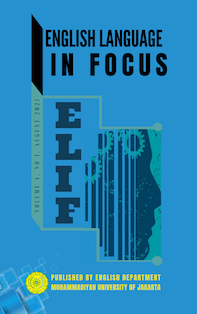Role-Playing Technique for Improving Students Speaking Ability in the Simple Past Tense
DOI:
https://doi.org/10.24853/elif.4.1.11-24Keywords:
speaking ability, role play technique, simple past tenseAbstract
This research aimed to find out how far the use of role-play technique could help the students of Triatma Jaya Badung Vocational High School in grade XI Hospitality Accommodation 1 to improve their speaking ability especially in using the simple past tense. Some theoretical frameworks are used in this research, such as the theory of teaching speaking by Richard and the theory of teaching grammar by Williams. Before the treatment was carried, a pretest was conducted to know the students’ basic ability, so that the achievement can be compared with the next circles after the treatment was given. The result of quantitative data showed that the use of role-play technique could improve the speaking ability of students of Triatma Jaya Badung Vocational High School. It can be seen from the result of the students’ achievement tests which increased continuously during the application of the role play technique. Those speaking aspects which were used as an indicator are vocabulary, pronunciation, grammar, fluency, and comprehension.References
Hadi, M. S., Izzah, L., & Masae, M. (2021). Factors Affecting Speaking Anxiety of Thai Students During Oral Presentation: Faculty of Education in TSAI. English Language in Focus (ELIF), 3(1), 79-88. https://doi.org/10.24853/elif.3.1.79-88
Hornby, A. S. (2000). Oxford Advanced Learner’s Dictionary. New York: Oxford University Press.
Khasinah, S. (2013). Classroom Action Research. Jurnal Pionir, Volume 1, Nomor 1, 1(2), 33–61. Retrieved from https://jurnal.ar-raniry.ac.id/index.php/Pionir/article/view/159/140
Krisdiana, B. P., Irawati, E., & Kadarisman, A. E. (2018). The Effectiveness of Role-Play Integrated with Word Cards on Students ’ Speaking Skill for Communication. Jurnal Pendidikan Humaniora, 6(2), 78–84. Retrieved from http://journal.um.ac.id/index.php/jph/article/view/11367/5399
Müller, A., & Daller, M. (2019). Predicting international students’ clinical and academic grades using two language tests (IELTS and C-test): A correlational research study. Nurse Education Today, 72, 6–11. https://doi.org/10.1016/j.nedt.2018.10.007
Parmawati, A., & Inayah, R. (2019). Improving Students’ Speaking Skill Through English Movie in Scope of Speaking for General Communication. Eltin Journal, Journal of English Language Teaching in Indonesia, 7(2), 43-53. https://doi.org/10.22460/eltin.v7i2.p43-53
Purwaningsih, N. K., & Dewi, S. P. A. A. P. (2019). 12 Improving Communicative Speaking Skill Of Nursing Students In English For Specific Purposes (ESP) Using Catur Jantra And String In Classroom Discussions. iELT-Con 2019, 135-145. Retrieved from http://pellta.org/uploads/8/1/8/9/81899300/ieltcon2019_proceedings.pdf#page=142
Quinn, S. (2014). Debating. Sustaining the Cherokee Family, 69–104. https://doi.org/10.5149/9780807869109_stremlau.7
Richard, J. C. (2008). Teaching Listening and Speaking: From Theory to Practice. Cambridge: Cambridge University Press.
Rizqiningsih, S., & Hadi, M. S. (2019). Multiple Intelligences (MI) on Developing Speaking Skills. English Language in Focus (ELIF), 1(2), 127-136. https://doi.org/10.24853/elif.1.2.127-136
Suyatno. (1997). Menjelajah Pembelajaran Inovatif. Jakarta: Masmedia Buana Pustaka.
Williams, J. D. (2005). The Teacher’s Grammar Book Second Edition. New Jersey: Lawrence Erlbaum Associates, Inc.
Downloads
Published
Issue
Section
License
Authors who publish with this journal agree to the following terms:
- Authors retain copyright and grant the journal right of first publication with the work simultaneously licensed under a Creative Commons Attribution License that allows others to share the work with an acknowledgment of the work's authorship and initial publication in this journal.
- Authors can enter into separate, additional contractual arrangements for the non-exclusive distribution of the journal's published version of the work (e.g., post it to an institutional repository or publish it in a book), with an acknowledgment of its initial publication in this journal.
- Authors are permitted and encouraged to post their work online (e.g., in institutional repositories or on their website) before and during the submission process, as it can lead to productive exchanges, as well as earlier and greater citation of published work (See The Effect of Open Access).


